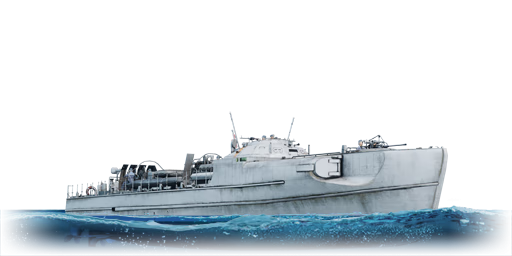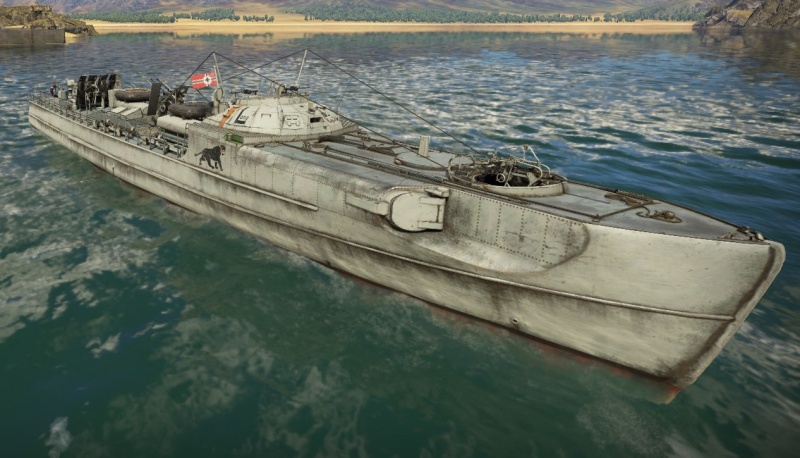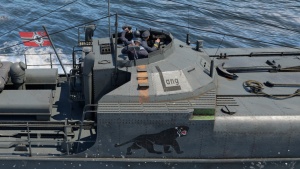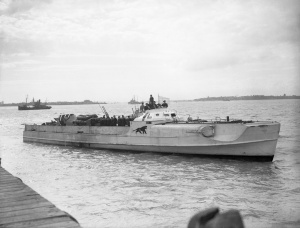S-204 Lang
Contents
Description
One of the best-known individual Schnellboots, the S-204 Lang, with a characteristic black panther, arrived under the white flag at the British naval base in May 1944, posing for an iconic photograph of the boat and its crew. The vessel can be found on covers of books, in model kits and playable in War Thunder!
The S-100-class, S204 Lang is a premium gift rank with a battle rating of 2.3 (AB/RB/SB) German motor torpedo boat, one of the earliest pre-orders offered to access the fleet closed beta test. It was removed from the store with the wide-release of the closed beta test in Update 1.79 "Project X", and hasn't returned for sale since.
General info
Survivability and armour
Unlike most of the low-BR vessels, Schnellboots have an armored bridge, with 13 mm hardened steel sloped between 22 and 76°, what makes it relatively rare to lose control over the vessel. And while this, combined with a relatively large size, might make the vessel appear to be very survivable, in reality it's a fragile vessel. A low crew count, few internal compartments, wooden hull and the necessity to expose its sides to delivery bulk of the firepower, make it an easy target to destroy.
The best survivability can be achieved by moving directly towards or away from the enemy, where a single compartment is exposed to the enemy fire. The second-best option is to approach the enemy at an angle, where the exposed silhouette remains to be relatively small.
Mobility
With a top speed of 109 km/h, the S-204 can beat even the hydrofoils in a straight line. It's one of the fastest naval vessels in the game, making it perfect for capturing the points and relocating to more comfortable locations when dealing with a bluewater vessels. For its large size, the vessel remains relatively maneuverable, being able to even dodge the incoming high-calibre projectiles. That said tough, a large size also impacts the turning circle, making it easier to crash into islands or other surface obstacles while maneuvering in narrow areas of the map designed for smaller coastal vessels.
| Mobility Characteristics | |||
|---|---|---|---|
| Game Mode | Upgrade Status | Maximum Speed (km/h) | |
| Forward | Reverse | ||
| AB | |||
| Upgraded | 109 | 33 | |
| RB/SB | |||
| Upgraded | 78 | 24 | |
Modifications and economy
Much like all of the premium vessels, S-204 comes with all modifications unlocked and installed. But given the engagement ranges it typically fights it, it might be best to uninstall the Torpedo Mode modification, in order to trade shorter rage for a much higher speed of the G7a torpedoes.
Armament
Primary armament
The main weapons of the S-204 are the three 20 mm cannons. A single-mount on the bow, and a twin-mount in the mid-section of the vessel. The bow-mounted 20 mm is the only gun on the vessel able to shoot at surface targets directly ahead.
In terms of the ammunition choice, the Universal or APT magazines are recommended against surface targets, while HET magazines are best used against aerial targets.
APT magazines have an advantage in being able to pierce through the ship, oftentimes entering through the bow and exiting through the rear of a small torpedo boats. These are best used against ships approaching directly frontally (e.g. in an attempt to bow tank).
HET magazines are highly advantageous against aerial targets, there they'll do the highest amount of damage per the round hit, while also offering the best chance of igniting the fuel tanks. Alternatively, they can be used against a particularly small boats, such as LS 3 or G-5.
- Universal: AP-T · AP · HEF-T · HEF
- 20 mm HET magazines: HEF · HEF-T · HEF · AP
- 20 mm APT magazines: AP · AP-T · AP · HEF
| Penetration statistics | |||||||
|---|---|---|---|---|---|---|---|
| Ammunition | Penetration @ 0° Angle of Attack (mm) | ||||||
| 10 m | 100 m | 500 m | 1,000 m | 1,500 m | 2,000 m | ||
| HEF-T | 2 | 2 | 2 | 2 | 2 | 2 | |
| AP | 36 | 35 | 27 | 20 | 15 | 11 | |
| AP-T | 36 | 35 | 27 | 20 | 15 | 11 | |
| HEF | 2 | 2 | 2 | 2 | 2 | 2 | |
| Shell details | ||||||||||||
|---|---|---|---|---|---|---|---|---|---|---|---|---|
| Ammunition | Velocity (m/s) |
Projectile mass (kg) |
Fuse delay (m) |
Fuse sensitivity (mm) |
Explosive mass (TNT equivalent) (g) |
Ricochet | ||||||
| 0% | 50% | 100% | ||||||||||
| HEF-T | 835 | 0.12 | 0 | 0.1 | 10.54 | 79° | 80° | 81° | ||||
| AP | 785 | 0.15 | - | - | - | 47° | 60° | 65° | ||||
| AP-T | 785 | 0.15 | - | - | - | 47° | 60° | 65° | ||||
| HEF | 835 | 0.12 | 0 | 0.1 | 10.54 | 79° | 80° | 81° | ||||
Secondary armament
In aft of the vessel there's a 37 mm secondary gun. Unlike on the regular, S-100 the gun shield here is much larger, offering added protection against the enemy gunfire. It can engage enemy aircraft at a very formidable range and offers a good damage output against the coastal vessels.
The AP ammunition can penetrate through any vessel it would meet, allowing to damage internal components, but it's at the price of much more limited damage. Purely in terms of the destructive potential against naval targets, the Universal belt seems to offer the shortest time to kill, offering a chance to put the enemy on fire, destroy components on the surface, and put armor-piercing rounds into the deep interior of the enemy.
Against aerial targets, the HE clips are the best, as they will instantly shred the structure of the enemy aircraft, while APT clips require you to directly hit critical components in order to score a kill against an airplane.
- Universal: AP-T · HEF-I
- 37 mm HE clips: HEF-I · HEF-I · HEF-I · HEF-I · AP-T
- 37 mm APT clips: AP-T · AP-T · AP-T · AP-T · HEF-I
| Penetration statistics | |||||||
|---|---|---|---|---|---|---|---|
| Ammunition | Penetration @ 0° Angle of Attack (mm) | ||||||
| 10 m | 100 m | 500 m | 1,000 m | 1,500 m | 2,000 m | ||
| HEF-I | 3 | 3 | 3 | 3 | 3 | 3 | |
| AP-T | 67 | 64 | 53 | 42 | 33 | 26 | |
| Shell details | ||||||||||||
|---|---|---|---|---|---|---|---|---|---|---|---|---|
| Ammunition | Velocity (m/s) |
Projectile mass (kg) |
Fuse delay (m) |
Fuse sensitivity (mm) |
Explosive mass (TNT equivalent) (g) |
Ricochet | ||||||
| 0% | 50% | 100% | ||||||||||
| HEF-I | 845 | 0.62 | 0 | 0.1 | 44.03 | 79° | 80° | 81° | ||||
| AP-T | 815 | 0.7 | - | - | - | 47° | 60° | 65° | ||||
Anti-aircraft armament
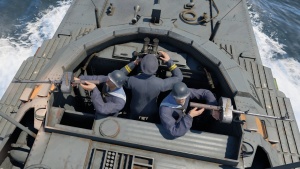
The anti-air armament is mounted on the bridge, with an extremely narrow field of fire - only only ±16° horizontally and -1°/+40° vertically. Weapon itself is only a single 7.92 mm on each flank, being more symbolic than anything else when it comes to the damage output. This is furthered by the fact that one has to expose the entire side of the vessel to aim at the enemy, which is best avoided as it makes a large shilluette of the S-204 a very easy target.
Additional armament
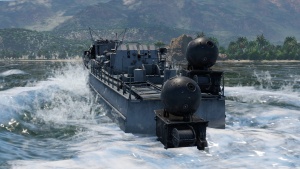
The G7a torpedoes are excellent for such a low-BR torpedo boat. With an explosive filler equivalent to nearly 360 kg TNT, it's large enough to break through any torpedo bulge. Damage itself is rarely enough to kill even a heavy cruiser with a single hit, but it will at least cripple any destroyer or a smaller vessel. It's recommended to uninstall the torpedo mode - in most maps there's little need to engage enemy vessels at over 6 km range, and having 45% higher speed makes a huge difference in accurately delivering a torpedo on the target.
The mines carried are also extremely dangerous, carrying explosive mass second only to the UDM-E. Realistically, the biggest limitation of the vessel in minelaying department is the number of mines carried - with just four available, one struggles to put down anything but a symbolic mine defense around capture points or critical locations. Scoring a kill with the mines is more luck than skill, but there's little disadvantage to taking them onboard, as the mines are unlikely to explode under the gunfire before the crew of the S-204 dies anyway.
Usage in battles
S-204 Lang can be used exactly the same as its tech-tree equivalent: S-100. Making a use of all your firepower requires you to expose an entire broadside - if an enemy sprays your entire broadside, you'll most likely die right away. This creates an interesting play style, where one has to either approach or depart from the enemy at a sufficient angle to make use of at least two of your guns, while preferably avoiding being fired upon, and thus - playing on the outskirts of the main engagements. An excellent top-speed of 104 km/h is a huge enabler in playing such a harassing role.
Pros and cons
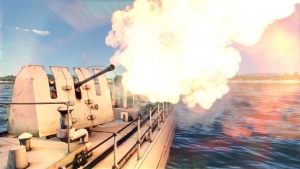
Pros:
- Broadside firepower
- Very good torpedoes with a reload available
- Ability to carry both: Mines and torpedoes at the same time
Cons:
- Below average survivability
- In most of the frontal arcs, only a single 20mm gun is able to engage the enemy
- Large profile makes an easy target for bomber and cannon-equipped fighters alike.
- Anti-aircraft 7.92 mm MG 15 has an extremely limited field of fire (only ±16° horizontally and -1°/+40° vertically) making it unable to engage anything but enemy planes in a very shallow dive perpendicularly towards the vessel.
History
The S-204 Torpedo boat from the 4th flotilla, nicknamed “Lang”, is one of the latest versions of the famous German S-100 Schnellboot (1945). The main difference with the S-204 are the slide rails for depth charges at the stern. The boat is also armed with 4 torpedoes of 533 mm calibre, an excellent 37 mm gun, one twin and one single C / 38 20-mm naval gun. Three engines allow it to reach a speed of 42.5 knots (almost 80 km / h). The S-204 Lang is a true child of war, a dangerous and fast vessel to destroy enemy ships of any class and type.
-From Store
S-204 was built in the Lürssen shipyard in Vegesack, commissioned on 19 August 1944 to 4. Schnellboot-Flottille in the Netherlands. In the records from July 1944 the S-204 was under the command of OLt..z.S. Hans-Jürgen Seeger, nicknamed HaJü after its commander. On 10 October 1944 flottila was rebased to Kiel, on Baltic Sea. Once the Battle of the Bulge has begun, the 4th Schnellboot Flotilla was ordered back to the western front, where it arrived on 28 December 1944. In April 1945 the vessel was nicknamed Lang, under the command of Lt.z.S. Claus Hinrichs.
Following the 8th of May 1945 surrender, the S-204 was captured by the British forces in Rotterdam and carried the chief of the 4th Schnellboot Flotilla, KKpt Kurt Fimmen, along with KptLt Bernd Rebensburg to the British Navy base Beehive in Felixstowe. Claus Hinrichs remained the commander of the vessel, and the S-204 arrived at the British base under the white flag (see: picture right).
The vessel was delivered to the USSR on 4 January 1946 and assigned a new designation TK-1020. The following fate of the boat varies depending on the source.
- According to the Schnellboots Attack, the vessel was reclassified from TK-1020 to reconnaissance boat РК-1674 on 17 June 1952, then reclassified to the dispatch boat ПОК-47 and finally decomissioned on 21 December 1954 to be broken up (decomissioning date also confirmed by the Warships of the Soviet Fleets).
- According to Senotrusov Vyacheslav, TK-1020 was assigned to the Baltic Fleet on 7 February 1946 (days before Baltic Fleet was split into 4th and 8th Fleets of the USSR) and after a little bit over 2 years in service, she was mothballed on 28 February 1948. Following that, she was removed from mothballing on 12 January 1949 and transferred for breaking up on 25 September 1950 to the ОФИ.
A historical fiction book Armada, by Steven Wilson (published by Pinnacle Books), tells a story of the fictional loader for the 2 cm/65 C/38 named Matrose Willy Hellwig in the Chapter 11 of the book.
Media
- Skins
See also
- S-100, tech-tree equivalent
- S-701, another premium Schnellboot
- Other coastal boats avaiable during the Naval closed beta test: PT-109, Pr.1124 MLRS
External links
- [German Naval History] Schnellboot 1939/1940
- [Roderick James Weston Timms] "E" Boats Surrender at Felixstowe
- [Retired Section Swansea Docks] German E Boat. S 204
- [Württembergische Landesbibliothek] 4. Schnellbootflottille
- [Förderverein Museums-Schnellboot e.V.] Buchstabenkennung in der 4. SFltl
- [Die Schnellboot-Seite] S-Boats in the Kriegsmarine 1935 - 1945: Whereabouts of the S-Boats
- [Navy of the World] Торпедные катера с S 201 до S 250 by Senotrusov Vyacheslav (Сенотрусов Вячеслав)
- Warships of the Soviet Fleets, 1939–1945: Volume III Naval Auxiliaries, Tom 3 by Przemysław Budzbon, Jan Radziemski and Marek Twardowski
- Schnellboots Attack: German Torpedo Boats of World War Two (Атакуют "Шнелльботы": Германские торпедные катера Второй мировой войны) by Miroslav Morozov, Sergei Patyanin and Mikhail Barabanov (Мирослав Морозов, Сергей Патянин, Михаил Барабанов) - page 108
| Lürssen Werft | |
|---|---|
| Schnellboot | |
| Type S-38 | S-38 · S-38b · MC 485* |
| Type S-100 | S-100 · S-147 · S-204 Lang |
| Fast Attack Craft | |
| Jaguar-class | Jaguar |
| Albatros-class | Albatros · Bussard |
| *S-67 in post-war Italian Service | |
| Germany boats | |
|---|---|
| Motor torpedo boats | LS 3 · LS 4 Esau · KM-5 · VS-10 |
| S-38 · S-38b · S-100 · S-147 · S-204 Lang · S-701 | |
| R-301 | |
| V-990 | |
| Jaguar · Hugin · Pfeil | |
| Motor gun boats | R-41 · R-130 · Krischan der Große |
| Motor torpedo gun boats | Albatros · Bussard · MZ1 · Pr. 206 |
| Minelayers | VS-8 |
| Germany premium ships | |
|---|---|
| Motor torpedo boats | LS 4 Esau · KM-5 · S-204 Lang · S-701 |
| Minelayers | VS-8 |
| Sub-chasers | M-802 |
| Frigates | Lübeck |
| Destroyers | Jaguar · Luchs · T31 · Z20 Karl Galster · Z25 · Z47 |
| Light cruisers | Karlsruhe |
| Heavy cruisers | Prinz Eugen |
| Battleships | SMS Nassau |


